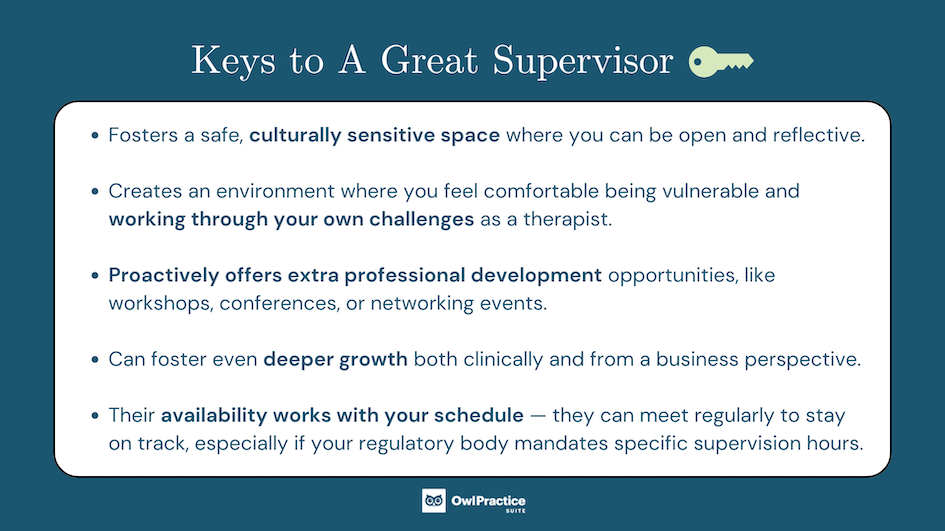Building a successful private practice takes a ton of hard work and dedication, no matter what stage of the game you are in. Practice owners often wear a variety of hats, and the numerous learning curves can often be steep. There’s clinical formulation and skill growth, note-taking and documentation, business accounting and advertising, managing work-life balance, and the list truly goes on. Yet while the aim of private practice often emphasizes income stability and building a solid client base, effective clinical supervision is a critical, and frequently overlooked, component of sustaining an ethical and thriving practice.
Supervision not only provides guidance and a foundation for ethical decision-making but also combats the isolating nature of private practice by fostering community and support. Mental health counselors and licensed professional counselors alike benefit from this structured, supportive relationship. We as humans truly weren’t meant to move through the seasons of life alone. With the right fit, this important supervisory relationship can also provide vital career and business mentorship — an area historically neglected in many psychotherapy and mental health counseling programs. That doesn’t have to be you. This article explores how clinical supervision can serve as a cornerstone for professional development, ethical compliance, and patient safety, so you and your business are in the best position for long-term success.

Clinical Supervision in the Context of Private Practice
So, what exactly is clinical supervision, and why is it such an essential part of growing as a licensed professional counselor or mental health therapist? Clinical supervision is essentially a structured, supportive relationship where an experienced and competent supervisor helps guide the professional development of a supervisee — someone who’s newer to the field or in a growth phase of their practice. This guidance goes beyond case conceptualization and clinical work; it’s about refining skills, deepening knowledge, and enhancing the overall competency-based models of therapy. The ultimate goal is to make you even better at your job, which, in turn, benefits client welfare and the overall quality of care.
Supervision can take many forms depending on the needs of the supervisee. As with therapy itself, supervision can take place in-person, virtually on online platforms, or through a blend of both. Options include one-on-one supervision for direct observation and feedback, group supervision for multiple perspectives, or peer supervision for shared insights. In-person supervision often provides a tangible connection that some new therapists prefer, while virtual options offer greater flexibility for daily work demands. A solid supervision contract helps outline expectations, frequency, and goals for the supervision sessions, ensuring clarity for all parties involved.
Mentorship in Action: The Value of an Experienced Clinical Supervisor
A clinical supervisor holds several key responsibilities, including guiding the development of clinical skills, overseeing ethical considerations, and supporting the supervisee’s overall professional sustainability. Qualified supervisors often bring years of experience in clinical practice, offering a wealth of knowledge about evidence-based practices like cognitive-behavioral therapy, family therapy, or even newer therapeutic approaches like AEDP or IFS.
The right supervisor’s personal style and professional role also matter. They foster a safe environment where supervisees can explore challenges and refine their clinical practice. Supervisors often integrate a developmental model or task-oriented model of supervision to meet the specific learning needs of the supervisee, whether they’re a trainee therapist or a seasoned professional looking to specialize further. Direct supervision, including case reviews and live observation, ensures that client welfare remains a top priority while bolstering the supervisee’s confidence and competency.
Additionally, a good supervisor understands that their guidance directly impacts the supervisee’s career trajectory. As mental health counselors in private practice, the value of a qualified supervisor is not only in improving technical skills but also in helping navigate supervision requirements set by professional bodies like the Ontario College of Social Workers and Social Service Workers (OCSWSSW) or the College of Registered Psychotherapists of Ontario (CRPO).
How Clinical Supervision Protects Professional Integrity
Still think clinical supervision is unrelated to running a successful private practice? Let me provide you with a hard line: to truly protect the practice you’ve lovingly built, it needs to maintain the highest professional standards of ethics and competency. Governing bodies mandate regular supervision to ensure therapists adhere to ethical codes and meet the rigorous standards of mental health counseling. Without this built-in support, therapists risk burnout, ethical missteps, or compromised patient safety.
Well-fitted clinical supervision provides a platform for therapists to navigate common and uncommon ethical dilemmas — such as managing dual relationships or staying within their scope of practice — without the burden of making these decisions in isolation. Supervision sessions also allow for thoughtful evaluation processes that ensure adherence to national board guidelines and ethical standards, creating a culture of integrity both in individual practices and the mental health field as a whole.

Finding the Right Supervisor
Choosing the right supervisor is one of the most important considerations for professional growth. You’re not just looking for someone with years of experience or a clinical supervision course under their belt — although those things are essential. A competent supervisor should align with your clinical interests and have direct experience in the areas you’re focusing on, whether that’s cognitive-behavioral models, trauma work, or counseling supervisors for trainee therapists. A good supervisor creates a safe, culturally sensitive environment where you can be vulnerable and open about your clinical challenges. They should also be proactive about offering professional development opportunities like workshops or conferences that complement your learning needs. For new therapists, supervisors can provide much-needed mentorship in areas like navigating a supervision contract, mastering case conceptualization, or learning the evaluation process.
Therapists can find a clinical supervisor by starting with their professional networks or reaching out to colleagues and mentors for recommendations. Many regulatory bodies also provide directories of qualified supervisors. Online platforms such as Psychology Today, or regional associations often list supervisors with details about their specialties and approaches. Lastly, therapists can also join local professional groups, supervision-focused workshops, or social media communities to connect with experienced clinicians offering supervision.
Wrapping Up
Clinical supervision is an essential cornerstone for fostering professional growth, maintaining ethical compliance, and building a sustainable and thriving private practice. By prioritizing quality of clinical supervision, mental health professionals, particularly those in private practice, can protect themselves from burnout while elevating their clinical practice. It’s an investment not only in professional standards but also in creating a reliable, ethical, and effective reputation in the broader community.
At its core, clinical supervision is the bridge between good intentions and transformative work. By cultivating this important relationship, therapists can show up for their clients, their practice, and themselves with confidence and purpose.

Manage with Owl Practice.
Reduce clinical administrative tasks and transform more lives with Owl Practice. Owl Practice provides all the tools you need to make your practice successful. Join the thousands of care professionals using Owl to run their practice every day.



